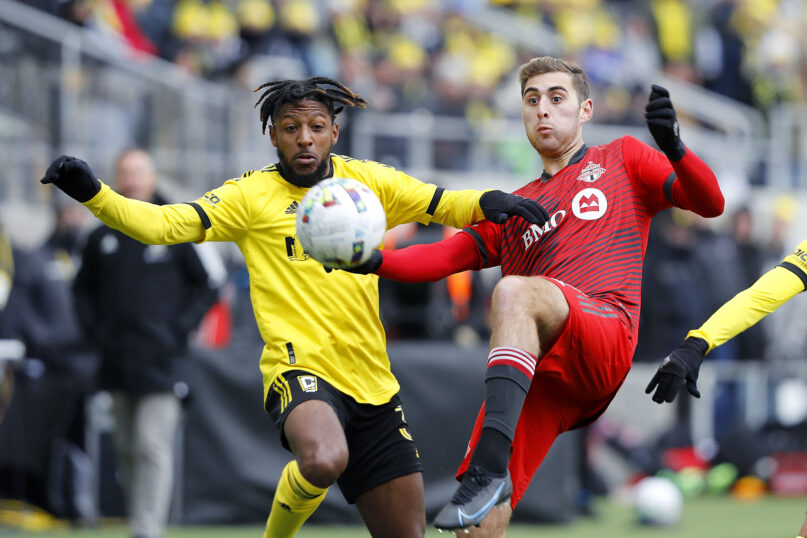(RNS) — As darkness fell over Saturday’s Major League Soccer match between the Columbus Crew and Real Salt Lake, the referee briefly halted play while Crew defenders Mohamed Farsi and Steven Moreira knelt on the sideline, eating pitted dates and sipping sports drinks.
The stoppage — a rarity in a sport that frowns on “timewasting” and reserves pauses in play primarily for injuries, substitutions and exuberance after goals — allowed the two to break their daily fast during the Muslim holy month of Ramadan before going on to play the game’s remaining 70 minutes.
The leaguewide “Drinks Break” policy is a shift from years past, when Muslim players were expected to wait until halftime or after the game to break their fasts, and MLS is one of several top-flight women’s and men’s soccer leagues in the U.S., Canada and Europe to offer the breaks this year.
Former Ghanaian international Lloyd Sam, the co-commentator for the Apple TV broadcast of the Columbus-Salt Lake match, acknowledged the change on-air, praising the new policy before adding, “In my day, certain guys just had to play through it.”
“Thank you for having this respect for our religion,” Columbus’ Moreira tweeted later Saturday evening.
Muslim athletes all over the world — including players in the NFL and NBA as well as men and women in the NCAA — train and compete during the holy month of Ramadan despite abstaining from all food and drink from dawn until sunset.
But with frequent breaks and shorter halfs, most sports don’t present the same challenge as soccer, although the timing of a competition also matters. Adama Sanogo, the University of Connecticut basketball team’s 6-foot-9 forward, has fasted throughout his team’s run to victory in the NCAA March Madness championship tournament. Some games were played before sundown, but he was able to break his fast at halftime during a game against Gonzaga, according to The New York Times.
Jeff Agoos, MLS’ senior vice president of competition, told Religion News Service the new 60-second breaks came after the league received numerous requests from players and staff about how best to manage the fasting process through Ramadan, which runs from March 22 to April 21 this year. The resulting policy was developed in conversation with the Professional Referee Organization, he said.
“There’s been broad range support for this,” Agoos said, adding the policy is an attempt to “be respective of people’s backgrounds” as well as address player health and safety.
A spokesperson for the National Women’s Soccer League, considered the world’s elite women’s league, told RNS it implemented a nearly identical “Drinks Break” policy this season, but, likely due to the scarcity of Muslim players, the policy has yet to be used. (The NWSL’s most prominent Muslim player, Racing Louisville’s Nadia Nadim, is out with a long-term injury and has said in the past that she fasts during training, but not on match days.)
Even so, said the spokesperson in an email, the policy’s goal is “to ensure we are able to protect player safety while allowing individuals to observe Ramadan.”
Kyla Cross, the Crew’s dietitian, said she currently prepares Ramadan nutrition plans for six players — two on the major-league team, two on the Crew’s developmental MLS Next Pro team and two in the team’s academy. But since 2015, she said, she has been helping players at various levels maximize hydration and nutrition before their fasts begin at sunup and after they end after sundown.

Abdirizak Mohamed. Video screen grab
Allowing for players to break their fast as soon as possible, she said, is “super, super exciting.”
Cross said she informed Farsi and Moreira about the new policy in the Crew’s locker room shortly before Saturday’s game. In response, she said, the players lit up.
“It shows how much it means to them, how they’re realizing that the league is respecting their religion and their culture,” she said.
Cross’ enthusiasm was echoed by Abdirizak Mohamed, a Muslim athlete who plays on the MLS Next Pro team Columbus Crew 2 as well as the Somali National Team. Mohamed said he has struggled in the past to find ways to break his fast midgame, once taking a penalty in another league when a referee accused him of timewasting after he used a sanctioned pause in play to hurriedly break his fast.
“For me, obviously, faith comes first,” Mohamed said. “Whenever it’s time for us to fast, we always put that before the athlete title.”
Mohamed said he noticed a culture shift last year, when he and other Muslim players in MLS Next Pro began informally negotiating Ramadan stoppages with referees and other teams before games. But instituting an official leaguewide policy, he said, was huge.
“It takes a few seconds, and it’s very appreciated on our end to be respected that way,” he said.
Mohamed may have been the first player to benefit from the policy when referees allowed him to break his fast during his team’s season opener against the New York Red Bulls II on March 26. The extra energy appears to have come in handy: In the game’s final seconds, Mohamed tied the score and Crew 2 went on to win the game after a penalty shootout.

The match is paused so Muslim players can break their fast due to Ramadan during the English Premier League soccer match between Everton and Tottenham Hotspur at the Goodison Park stadium in Liverpool, England, April 3, 2023. (AP Photo/Jon Super)
The MLS policy mirrors a similar provision instituted late last month across the Atlantic in the United Kingdom’s Premier League and English Football League. Referees for the men’s leagues were encouraged to coordinate with players before the game begins and agree on an estimated time to halt play. (Though MLS’ breaks are officially 60 seconds long, the referees appear to be showing flexibility as the policy is phased in: The Columbus-Salt Lake match paused for about three minutes.)
Premier League officials appear to have tested the policy in recent years. In 2021, referees stopped a match between Leicester City and Crystal Palace so two players could break their fast. A referee in Germany’s top-flight league, Bundesliga, did the same during a 2022 match.
But other leagues have refused to follow suit. Ligue 1, France’s top-flight soccer league, reportedly sent an email to referees this past weekend warning them against allowing fast-breaking stoppages. According to the Daily Mail, the leaked email declared: “Football takes no account of the political, religious, ideological or trade union considerations of its actors.”
On Sunday, defender Jaouen Hadjam, who plays for Ligue 1 team FC Nantes in addition to the Algerian national team, was left out of the French team’s squad by his coach for maintaining his fast for Ramadan.
“Those who fast, I support them. On matchdays, you should not fast,” Nantes head coach Antoine Kombouare told The Athletic.
In the past, religious authorities were often the ones pushed to compromise. In the wake of an incident in which three players were issued warnings for fasting, Germany’s Central Council of Muslims — after consulting with Islamic scholars, including some at Egypt’s Al-Azhar — declared in 2010 that an athlete could break the Ramadan fast earlier on match days if the sport is the athlete’s only source of income and if fasting affects the player’s performance.





